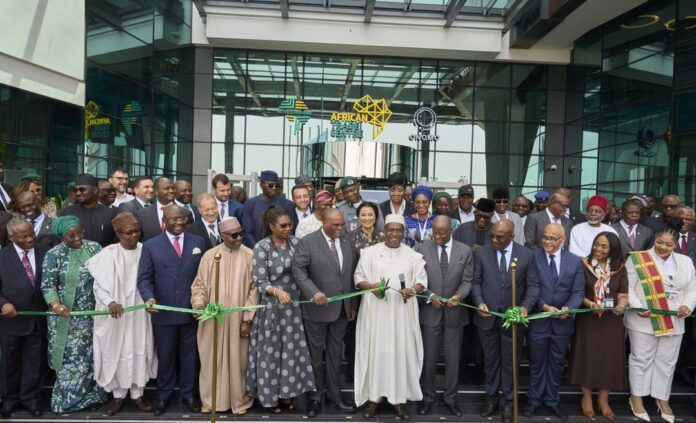In April 2025, a major milestone was reached in Abuja as the African Export- Import Bank (Afreximbank) officially opened its $120 million African Trade Centre. This project had been in the works for over three years, spanning a total of 41 months. Now completed, the centre stands as a symbol of Nigeria’s determination to become a regional economic hub and a driver of trade integration across Africa. It also sends a clear message about Afreximbank’s long-term commitment to intra-African trade, regional cooperation, and sustainable development.
The timing of the centre’s launch could not be more significant. The global economy has faced tough headwinds, and Africa has not been immune. According to the Afreximbank African Trade Report 2024, the continent experienced a slower growth rate of 3.2 percent in 2023, down from the 4 percent recorded in 2022. The report also highlighted a decline in intra-African trade growth—from 10.9 percent in 2022 to just 3.2 percent in 2023. However, despite this drop, intra-African trade accounted for nearly 15 percent of total trade on the continent, an improvement from 13.6 percent in the previous year.
Still, the continent lags behind other global regions in terms of internal trade. Recognizing this gap, Afreximbank has doubled down on efforts to build solid trade infrastructure. One of its boldest moves yet is the development of African Trade Centres in strategic capital cities. These centres aim to support the African Continental Free Trade Area (AfCFTA) by eliminating trade barriers and promoting smooth trade across national borders.
The Abuja centre is the first to be completed under this plan, with six others expected to follow in cities like Kampala, Cairo, Kigali, Tunis, Harare, and Yaoundé. Together, these hubs are envisioned as key pillars of the AfCFTA ecosystem, acting as nerve centres for trade, investment, and policy dialogue. The Abuja centre is the flagship among them.
Afreximbank’s choice of Nigeria as the launch pad for this initiative speaks volumes. As the continent’s largest economy and most populous nation, Nigeria is well-positioned to lead the push for greater trade connectivity. The centre, built on a 5,856-square-metre plot in the Federal Capital Territory, is designed not just as a business hub but also as a platform for innovation and growth.
The facility itself is a striking two-tower structure, with each tower built for a unique purpose. One of the towers will house Afreximbank’s permanent regional office for West Africa, marking the bank’s first full-fledged presence in Nigeria. The second tower is home to a 148-room hotel, which will cater to business travellers, international delegates, and trade mission participants. Other features of the complex include meeting rooms, a wellness centre, a fine-dining restaurant, and a fully equipped business lounge.
Another vital component of the centre is the technology incubation hub and SME support facility. With this, Afreximbank is showing it understands where Africa’s growth will come from—its small businesses and young entrepreneurs. This part of the center is expected to generate jobs, stimulate innovation, and drive inclusive development.
Beyond the physical infrastructure, the centre is expected to influence how trade is conducted in Africa. The integration of digital solutions such as the Digital Africa Trade Gateway will allow businesses to access services like payments, customs clearance, and trade documentation—all from a single platform. This could make cross-border trade faster, cheaper, and more transparent, aligning with AfCFTA’s broader goals.
At the commissioning ceremony, President Bola Tinubu, represented by Dr. George Akume, Secretary to the Government of the Federation, called the Abuja centre a landmark achievement. He described it as more than just a building, but rather a “launchpad for innovation, entrepreneurship, and sustainable development.” He also pointed out that the centre aligns perfectly with Nigeria’s economic agenda, particularly in areas like job creation and regional integration.
Dr. Jumoke Oduwole, Minister of Industry, Trade, and Investment, echoed these sentiments, praising Afreximbank for its foresight. She said the center would help attract investment, grow local businesses, and enhance Nigeria’s role in the AfCFTA framework.
Sustainability was not overlooked in the project. The structure was built to meet global environmental standards and is on track to receive Gold or even Platinum certification under the U.S. Green Building Council’s LEED program. If awarded, this would make it one of the few LEED-certified buildings in Nigeria and across West Africa.
Afreximbank’s president, Professor Benedict Oramah, also addressed the gathering. He explained that while the Abuja centre is bank-owned, other centres may follow a franchise model. Regardless of the setup, each location will serve the dual purpose of boosting trade and acting as a regional office. Professor Oramah credited the Nigerian government for its long-standing support, stating that Nigeria has consistently provided the right environment and policy backing to help Afreximbank thrive.
The bank has already committed $1 billion to the AfCFTA Adjustment Fund and granted an additional $10 million to help operationalize the fund. Looking ahead, it plans to double its intra-African trade financing from $20 billion in 2021 to $40 billion by 2026.
The Abuja centre, in many ways, marks the beginning of a new chapter for Africa’s trade story. It shows what is possible when bold vision meets consistent support and execution. As Nigeria continues to position itself as the heart of Africa’s economic engine, the center is expected to play a key role in redefining how goods, services, and investments flow across the continent.
What happened in Abuja this April may seem like just another ribbon-cutting ceremony on the surface. But for those watching the bigger picture unfold, it’s a powerful sign that Africa is moving closer to becoming a truly interconnected, self-reliant, and prosperous continent—with Nigeria leading the way.

